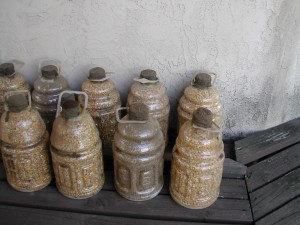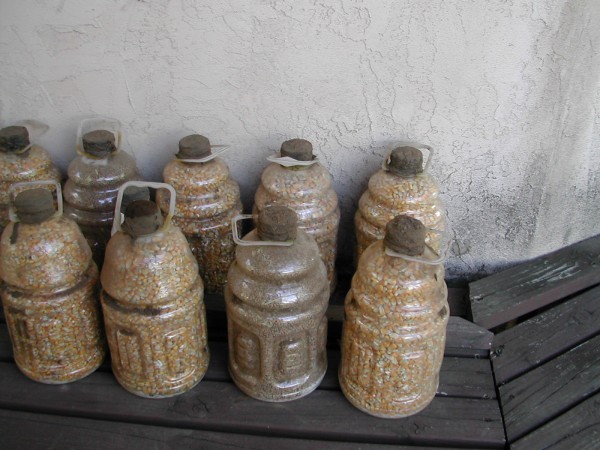When the SHTF, even if it’s only for a short while, you’re going to need calories, a good balance of carbs, proteins and fats and all the essential vitamins and minerals to get through it. Even very basic cooking skills will pay off if you use the items on my list in combination, in fact, you could make hundreds of meals from them.
Also, I’m sure that in any emergency small comforts will be important for morale, so I added in a few treats to my list of essentials. Leave your thoughts on the list and tell me what I forgot, in the Comments section at the very bottom of the page.
1. Rice and pasta
Rice and pasta are easy to store and easy to cook (or soak) and requires almost no labor, only water. Rice offers some protein and carbohydrates for energy, but don’t rely on it for much fiber or fat. Store white rice (easily available from Costco in huge sacks) because brown rice will spoil sooner because of its natural fats. Keep pasta in a cool dark and dry storage area. Other grains like couscous, tapioca and semolina will also keep for a good long time and provide nutritious, filling meals.
2. Beans
Beans are a great source of carbs, fiber and protein. They come dried or canned. And there are many varieties so you can ring the changes. You can mix them up and make a salad ( I add a chopped onion and some balsamic vinegar) to accompany meat — or they can replace it for vegetarians or a lighter meal. Beans are also full of vitamins and other beneficial nutrients. Beans can be added to any meal to add substance and will fill you up.
3. Tins of fish, chicken or meats
Canned fish and meats will last a long time. SPAM and corned beef and chicken are all relatively inexpensive and if you buy a couple of cans a week you’ll quickly build your emergency store cupboard. Or purchase a tray at a bulk store like Costco.
Canned fish like tuna or salmon is good source of protein and high in Omega3s.
All of these items are already cooked and can be eaten out of the can. In addition, they are all great bases for a proper meal. I have a few cans of Sloppy Joe in my emergency store. It won’t take much heating and is dirt cheap and full of calories.
4. Honey or Maple syrup
Honey and tree syrups like maple are great natural, unprocessed sweetening agents. They taste delicious and will last indefinitely. Honey left in the pharaohs’ tombs thousands of years ago was still found to be edible. You can mix it in drinks or add to boring things like oatmeal to make them interesting.
5. Instant Coffee, Tea and Chocolate beverages
Keep it instant. Or keep it sealed. Instant will be the way to go in disaster scenario as there’s no waste, no equipment and no waiting. Tea helped the Brits get through a war, and there’s nothing so calming as a shared hot beverage.
6. Dried foods
Get yourself a food dryer. Meat jerky is simply dehydrated meat and can be made from anything, even squirrel! Homemade jerky will last you a few months. Commercial grade will last longer. You can also dry any fruits or veggies or mushrooms you can harvest which may be useful in months when they are out of season. Onions are especially good dried.
I like the idea of those flavoring sauces you get, like gravy, in dried food packets. They don’t cost much, they don’t take up much room but they will provide much needed flavor to bland emergency cooking.
7. Alcohol
Of course it’s not an essential, but it will make most situations better, you can use it as an anesthetic and it’s great to barter with. In fact, I’d go as far as to suggest you have tobacco products in a humidor, and some extra ammunition. You really could become the ATF convenience store in an emergency. Just don’t go bragging about these things. Keep your self-reliant preparedness to yourself.
8. Dried Fruit
Dried fruits are actually quite moist. They are easy to cook with or to just snack on. They can be rehydrated and plumped with water (you’ll make a syrup at the same time) or alcohol. Store them in the freezer if you have power or in an airtight container if you don’t. They contain many vitamins and natural sugars that are great, healthy options.
9. Baking Soda
It will cause your bread to rise (soda bread) if you can’t get yeast. It cleans almost everything and is a great deodorant. You can brush your teeth with it and use it as a paste to clean most things.
10. Flour and cornstarch
You need to stock a lot of flour. Pastry is a great basis for a nourishing meal. Beware, flour tends to attract small bugs called weevils. I suggest making the effort to pack useable quantities into small Ziplok bags and squeeze the air out of them. That way the whole batch won’t get infested.
Cornstarch is a thickening agent used in cooking to make sauces and gravy, but it has many other uses. It’s hydroscopic and absorbs water which makes it a great thing to put on blisters or under your armpits.
11. Corn

Dried corn, like popcorn will keep you alive. A survival friend of mine buried a thousand fruit juice bottles sealed with roofing cement in his yard. The jars were filled with corn kernels and salt. Not fine dining but a great food to keep you going through a long, hard winter.
12. Spices & Herbs
Turn dull foods into delicious meals. Most spices and herbs have alternative medicinal properties so stock up on them and get yourself a herbal remedies guide.
13. Vinegar
Vinegars will last several years. Use them in cooking, preserving, pickling and cleaning.
14. Salt
You can’t live without it and it makes everything taste good. It’s also a disinfectant and great for gargling with to ease a sore throat. It’s super cheap so buy a pack of salt drums and remember you can barter with them.
15. Nuts
Nuts last longest when stored in the freezer as they go off in the heat and become rancid. Peanut butter can last upwards of 5 years in a sealed jar. The mass-produced stuff has preservatives. The real deal, nut butter, may require stirring after opening.
16. Powdered Milk
Cook with it, drink it, add it to beverages. It only tastes weird for a while and then you get used to it. It will make life worth living when you can make decent desserts like rice pudding!
17. Eggs
Powdered eggs can be reconstituted with water and will last years. Or you can stockpile the liquid eggs you can get at the supermarket so long as you have a freezer. Eggs are an important part of most cooking techniques.
18. Sugar
Sugar is added to many recipes. And while it’s not healthy to eat too much while you’re sedentary, calories become more important when you’re working through a physical emergency and have to do everything by hand. (That’s why Amish food is fatty or sweet.)
Canned fruits are going to be a great resource in an emergency. Also Jello. And fruit jelly is an instant treat. It’s versatile enough to feed to children and to sweeten a dessert or beverage (the Russians use it in tea!)
19. Water
Store some water. Get a water filter. Best yet, if there’s water near you as ground water or a spring, get a pump going. It’s not that hard to sink a well and having your own water source could be a deal breaker one day.
20. Oils & Fats
Buy vegetable oils in those big cans you see on the bottom shelf at the supermarket. Crisco is perfect! Oils can last at least 2 years (thought it’s speculated that they will last longer) unopened and about 1 year after they’ve been opened. Oils can be added to flour to make breads, pastries and cakes, it will provide a base for frying, and it contain a ton of calories to get you through a hard day’s physical labor.
Think of coconut, almond and sesame oils, too. They can be used to dress leaves you find for a salad or to stir-fry.
